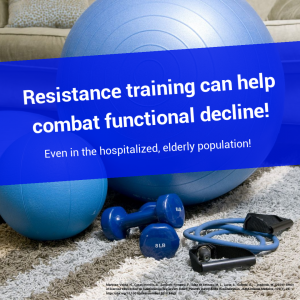There was a presentation at @ACSM’sInterntaionalHealth and Wellness Summit this past month that really stuck with me for multiple reasons but mainly because it got my mind firing with connections to the cancer population. The main focus of this presentation was why resistance training is vital in an exercise program.
One research study that was used as supportive evidence looked at how a resistance training program in elderly hospitalized patients could improve physical functioning. Low and behold, those who had an exercise program along with the usual care of physical therapy during hospitalization reversed the typical decline in physical functioning seen in just 8 days of time. (1)
How does this research study relate to those living with cancer?
Over half (about 70%) of those diagnosed with cancer will be 65 and older by 2030. (2)
Furthermore, there is growing evidence to support that cancer treatment in itself may accelerate the aging process! Meaning, although one is 30 years old- the biological age may actually be older because of the effects that cancer treatment has on the body. (3)
Those living with cancer who are elderly or high risk and functionally disabled are more likely to have higher rates of depression, anxiety and pain as well as longer hospital durations. (4)
We know that exercise is a safe and effective way to combat functional decline (even in the elderly!), cancer-related fatigue, anxiety and depression.
We need to . . .
- Incorporate exercise education and instruction during hospitalized stays and discharge planning
- Include resistance training as part of this exercise education and instruction. Walking and other aerobic exercise is great but so is resistance training – especially when paired together
- Advocate for these individuals to be more active throughout the cancer care continuum
In order to help PREVENT . . .
- Hospitalization
- Functional decline
- Treatment intolerance ,etc.

And . . .
- MOST importantly to IMPROVE QUALITY of life and outcomes!
(2) https://ascopubs.org/doi/full/10.1200/EDBK_20042
(3) https://www.ncbi.nlm.nih.gov/pmc/articles/PMC7865902/
(4) https://jnccn.org/view/journals/jnccn/18/6/article-p747.xml?print

Leave A Comment